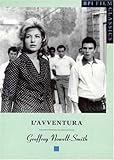L’avventura (BFI Film Classics)
L'avventura (BFI Film Classics)

Illustrated Michelangelo Antonioni's starkly beautiful L'avventura is one of the great masterpieces of European art cinema, though at Cannes in 1960 it baffled and enraged its first audience. The plot is simple: a woman disappears while visiting a tiny, remote island with friends and it's as if they don't notice that she's gone. What has happened to her? L'avventura disclaims the conventions of narrative cinema in the most radical way: it never provides an answer to this question. Antonioni has often been labelled pessimist but, as Geoffrey Nowell-Smith argues, his work is not judgemental and is better described as sceptical, concerned with truth rather than consolation. L'avventura seems indifferent to either progress or decadence, Nowell-Smith writes: its characters are placed fairly and squarely where they are, with no past to return to or future to advance to. Stripped of consoling certainties, existentially alone, they are observed with a meticulousness that takes nothing for granted. As well as detailing the circumstances of production, Nowell-Smith relates L'avventura to other groundbreaking films of the period and to all of Antonioni's earlier and later work. In order to appreciate the significance of L'avventura, he concludes, it is necessary to understand not only that the film is a classic but also that it was a revolution in cinema.L'Avventura (The Adventure), the movie that put director Michelangelo Antonioni on the map, is a masterpiece. For Geoffrey Nowell-Smith, editor of The Oxford History of World Cinema and author of this book, "no film before or since has ever made such an impression on me.... It is a film which makes the world look different, and after which other films look stale."
The plot is deceptively simple. A beautiful young woman mysteriously disappears while touring off the coast of Sicily. Though initially distressed at this loss, her lover and best friend fall in love, betray one another, and then make some hesitant moves toward reconciliation. Nowell-Smith demonstrates that Antonioni transformed this tale into an astoundingly profound meditation on romance, friendship, personal identity, women's autonomy, living in the modern world, even meaning itself.
The author also tells the fascinating history of the film's production (and how close Antonioni came to shutting down shooting before he completed the picture!) and its troubled, but ultimately enthusiastic, critical and popular reception. As an added treat, the volume closes with what Nowell-Smith considers the best essay written about Antonioni, a speech delivered in 1980 by the great critic Roland Barthes. In it, Barthes considers three features of Antonioni's work, "which to my mind constitute the artist: vigilance, wisdom, and, most paradoxical of all, fragility." --Raphael Shargel

List Price: $ 14.95
Price: $ 10.29
No comments:
Post a Comment